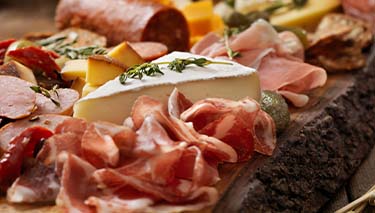Soft cheese can be a difficult thing for many mothers to give up during pregnancy. Especially if their Friday night ritual involves a get together and having a few different types of cheese and crackers. Many women crave cheese when they're pregnant, even if it's not been among their favourite foods before.
Cheese is an excellent source of essential nutrients for pregnant women, but certain kinds can be dangerous for an unborn baby. Cheese will supply you and your baby with necessary calcium, phosphorus, magnesium and vitamin B12. Bone growth and tooth formation are just some of the benefits. But it needs to be the right kind of cheese to be safe.
The problem with soft cheese during pregnancy
Soft cheeses are considered too risky for pregnant women and you should avoid eating them even those made with pasteurised milk. This is because during the manufacturing process, soft cheeses may be exposed to and contaminated by a dangerous bacterium called listeria.
Listeria can cause a rare but dangerous infection called listeriosis. This infection can be especially serious for pregnant women if it is transmitted to their unborn baby. It can lead to complications including, blood poisoning, miscarriage, premature labour, or stillbirth. Pregnant women are more at risk from listeria because hormonal changes lower their immunity.
In Australia and New Zealand, listeriosis in pregnant women is considered rare. However, if you avoid foods at risk of being contaminated it's very likely you will be fine.
You should avoid these types of cheese and foods during pregnancy:
- Brie
- Camembert (Australian and imported)
- Blue-veined cheese
- Fetta
- Ricotta
- Danish Blue
- Gorgonzola
- Roquefort
- Cottage Cheese
- Any cheese made from un-pasteurised milk
It's also important to avoid other types of food that may be at high risk of contamination with listeria. Processed, ready-to-eat luncheon meats, soft-serve ice cream, salads and chilled or cold-smoked seafood are the most risky types of food.
Some common examples include:
- Prosciutto
- Devon
- Processed chicken and turkey
- Ham
- Salami
- P t and other meat spreads
- Pre-made and refrigerated salads
- Pre-cut fruit salads
- Seed sprouts
- Cooked and chilled prawns
- Smoked salmon or trout
- Smoked oysters
- Chilled crab meat
- Pre-prepared sushi
- Raw fish, including sashimi and salmon
- Fresh oysters
- Raw eggs
- Unpasteurised milk and dairy products
Cheese that is safe to eat during pregnancy
Generally, hard types of cheese are considered safe to eat during pregnancy. The levels of listeria found present in hard cheeses are extremely low and are therefore not considered a risk for pregnant women.
Some of the hard cheeses that are safe to eat during pregnancy include:
- Cheddar
- Edam
- Parmesan
- Gouda
- Jarslberg
- Emmental
- Gruyere
- Cooked haloumi
- Havarti
- Manchego
- Paneer
- Pecorino (hard)
- Provolone
Enjoy the above cheeses as a snack with whole-grain crackers or fresh fruit; grated and sprinkled over soups and salads or in a sandwich or omelette.
Soft cheese also becomes safe to eat when it is fully cooked. So, products made with soft cheeses that are fully cooked, like pizza or baked cheese, are generally safe to eat when you are pregnant.
Cooking food at risk of contamination with listeria kills off the bacteria and makes it safe to eat. To ensure all the bacteria have been killed in the cooking process, make sure that any cheese is cooked until it's steaming hot the entire way through. This applies to all foods, including meat and fish as well.
Soft cheese that is warm and just melted could still contain listeria and harm your unborn baby.
It is also important to wash all fruits and vegetables before eating them. And be careful too about kitchen hygiene. Change kitchen towels daily and have soap and paper towels for hand drying at your kitchen sink.
Make sure you
store and prepare food safely as well. If you're unsure about how a food has been prepared by someone else, avoid eating it just to be on the safe side.
If you're unsure about the risk of eating a particular food, the safest approach is not to eat it. Check with your maternity care provider is you're unsure.
For more information check:
http://www.foodauthority.nsw.gov.au/_Documents/foodsafetyandyou/listeria_and_pregnancy.pdf
Edited and reviewed by Jane Barry, Midwife and Child Health Nurse July 2021.


Last Published* May, 2024
*Please note that the published date may not be the same as the date that the content was created and that information above may have changed since.




















